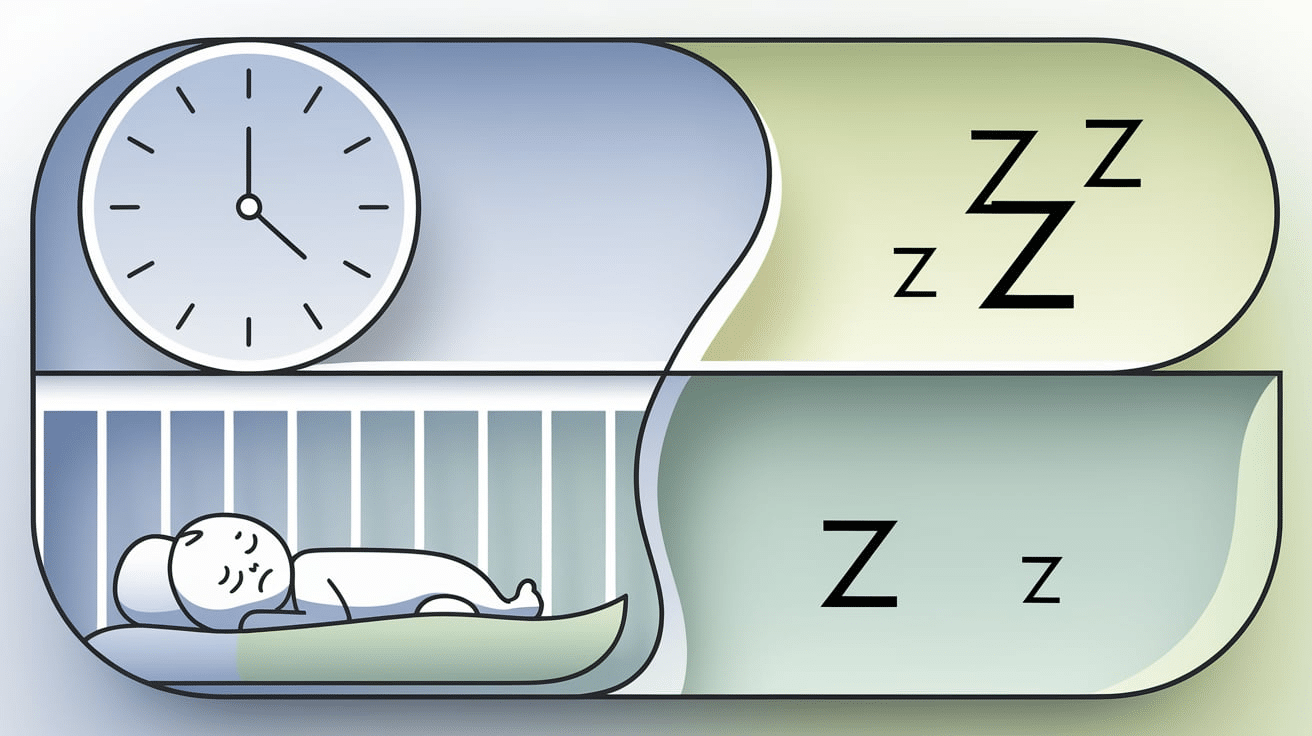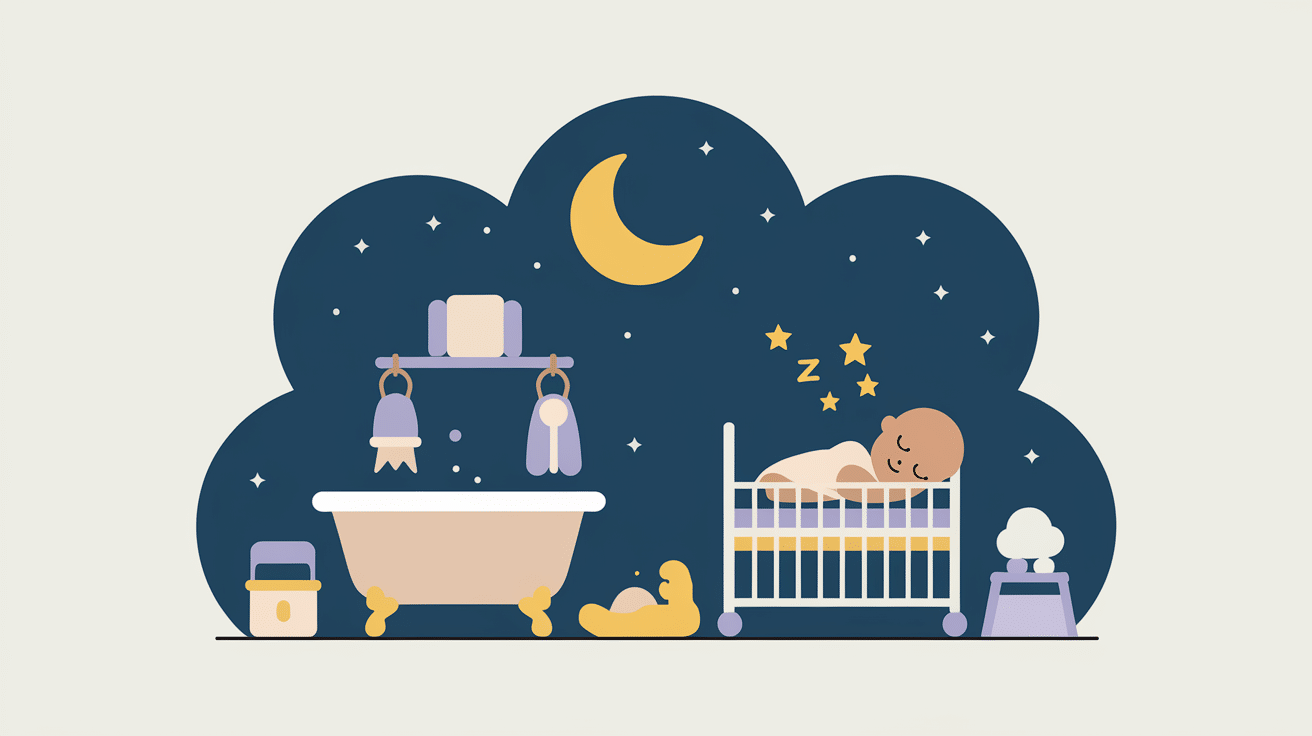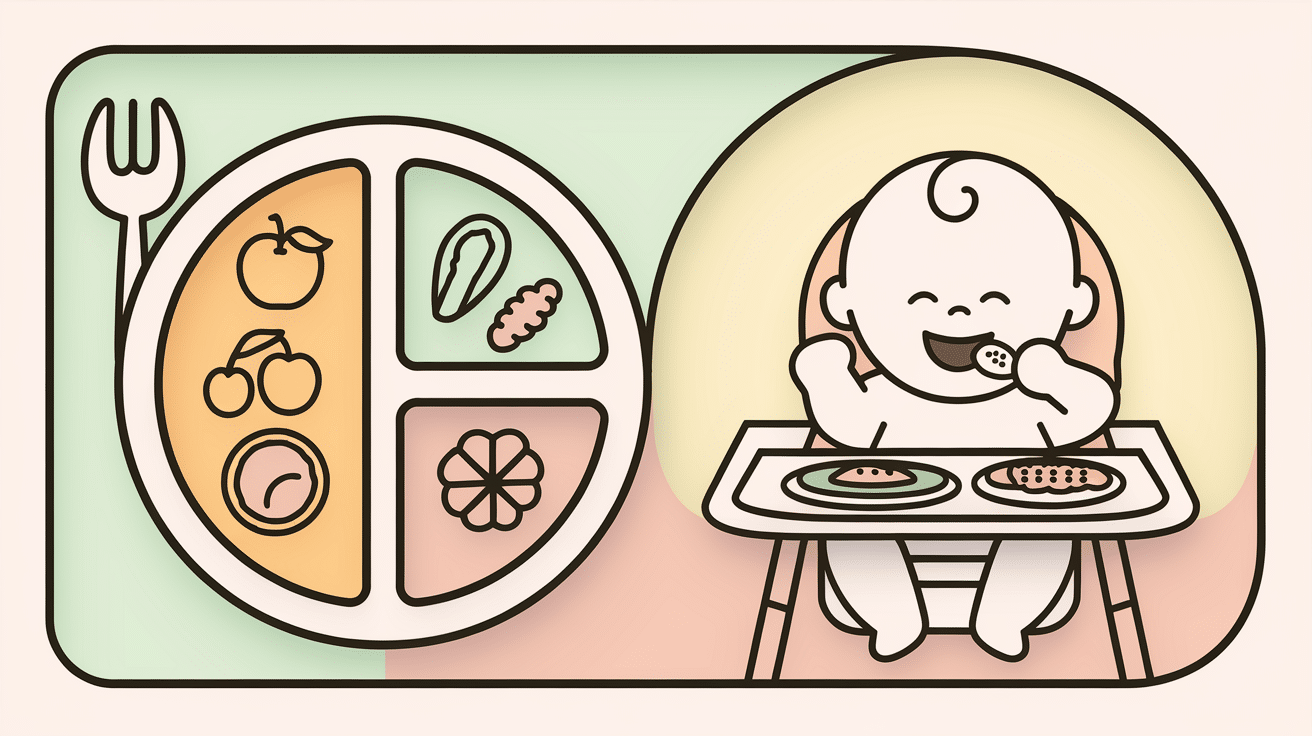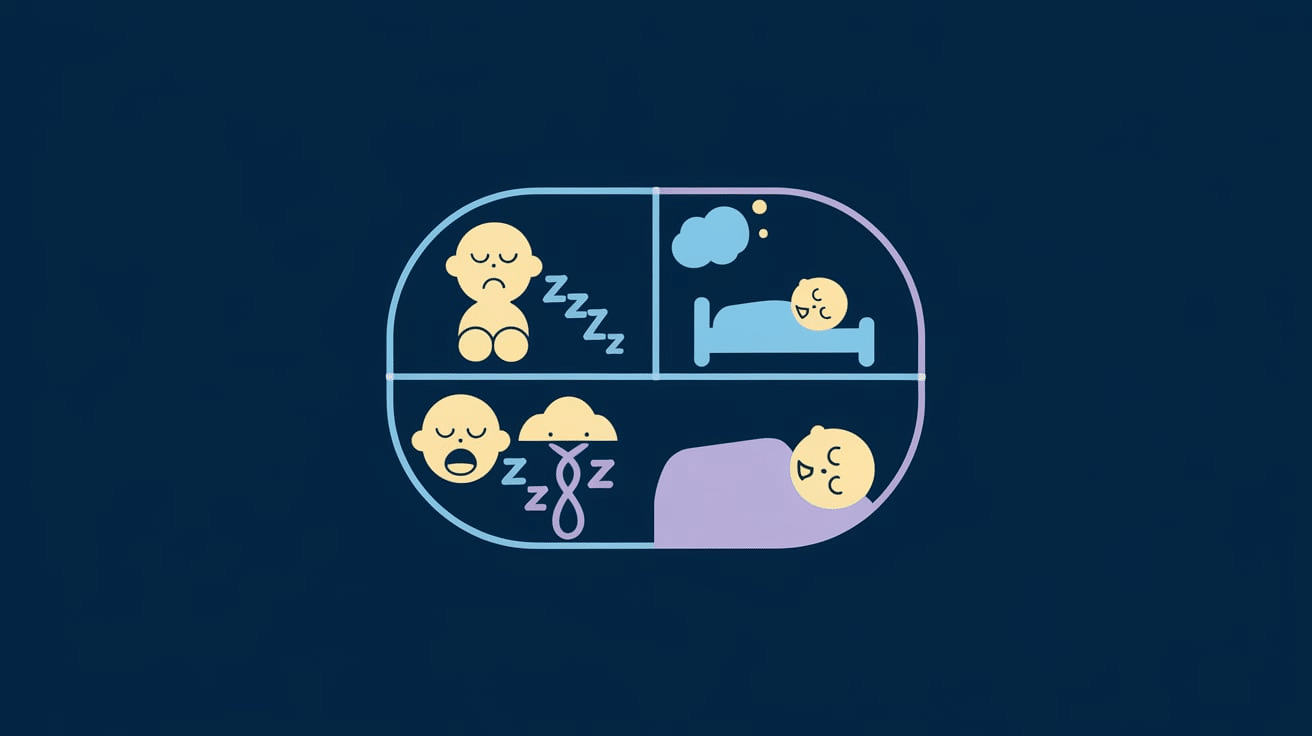
As your baby approaches their first birthday, you may notice significant changes in their sleep patterns.
This exciting developmental stage brings new challenges and opportunities for establishing healthy sleep habits that will benefit your little one for years.
In this guide, we’ll explore the optimal sleep requirements for 12-month-olds, including daily sleep needs and how to balance daytime naps with nighttime rest.
We’ll explore the world of wake windows—those crucial periods when your baby is naturally a—and learn—how to recognize when your toddler is ready for sleep.
Understanding these sleep fundamentals can help you create a schedule for your growing child while supporting their mental and physical development during this remarkable stage.
Naps for a 12-Month-Old Baby
How Many Naps Should a 12-Month-Old Take?
Most 12-month-olds still benefit from taking two naps daily, typically morning and afternoon. This schedule helps them get 2.5-3 hours of daytime sleep without becoming overtired between sleep periods.
The length of each nap depends on several important factors unique to your baby. Their individual sleep needs, activity level, and the quality of their nighttime sleep all play significant roles in determining how long they’ll nap during the day.
Some babies naturally take shorter, more frequent naps, while others prefer one longer nap with a shorter second nap. Both patterns can be normal if your baby seems well-rested and happy throughout the day.
Key factors affecting nap lengths:
- Environmental factors (noise, light, temperature)
- Consistency of nap routine and location
- Growth spurts and developmental milestones
How Long Should a 12-Month-Old Nap?
At 12 months old, most babies need 2-3 hours of total daytime sleep. This typically breaks down into two naps: a morning nap lasting 45 minutes to an hour and an afternoon nap lasting 1-2 hours.
The afternoon nap is usually longer because your baby’s sleep drive is stronger after waking for 3-4 hours. Every baby has unique sleep needs, so some might need slightly more or less daytime sleep.
The most important indicator is your baby’s mood and energy level throughout the day. A well-rested baby is generally happy, engaged, and able to play independently.
If your little one struggles with short naps or poor nap quality, several strategies can help improve their daytime sleep.
Tips for better nap quality:
- Create a consistent pre-nap routine to signal sleep time
- Ensure the sleep environment is dark, cool, and quiet
- Schedule naps based on wake windows rather than strict clock times
2-Nap Schedule To Follow

Here’s a simple daily plan for your 12-month-old who takes two naps
Morning
- 7:00 AM: Wake up time + breakfast
- 9:30-10:30 AM: First nap (1 hour)
- 10:30 AM: Snack after waking
Afternoon
- 11:30 AM: Lunch
- 2:00-3:30 PM: Second nap (1.5 hours)
- 3:30 PM: Snack after waking
Evening
- 5:30 PM: Dinner
- 7:00 PM: Start bedtime routine (bath, book, cuddles)
- 7:30 PM: Bedtime
This schedule gives about 13-14 hours of total sleep, with 2.5 hours during the day and 11-11.5 hours at night.
Remember that all babies are different. Watch your baby’s tired signs and adjust times as needed. The goal is a happy, well-rested child, not a perfect schedule.
Transitioning to a 1-Nap Schedule

Around 12-15 months, many babies start showing signs they’re ready for just one nap. Watch for these clues:
- Fighting the second nap but sleeping well for the first
- Taking too long to fall asleep at bedtime
- Waking up early in the morning
- The first nap getting later and later
- Second nap pushing bedtime too late
To make this big change easier:
- Start by moving the first nap 30 minutes later each day until it’s around 12:00 PM
- Aim for one longer nap (about 2-3 hours)
- Move bedtime earlier temporarily (30-60 minutes) to prevent overtiredness
- Be patient – this change may take 2-3 weeks
- Use quiet time in the afternoon if your baby seems tired
Remember that some days might still need two shorter naps during this transition. Follow your baby’s cues and be flexible.
When to Wake Your Baby from Their Afternoon Nap?
Most sleep experts recommend ending your 12-month-old’s afternoon nap by 3:30-4:00 PM to preserve a healthy bedtime routine.
This timing is crucial because babies need sufficient wake time before bedtime to build enough sleep pressure for a smooth transition to nighttime sleep.
Ideally, your 12-month-old should have a wake window of 3-4 hours between the end of their last nap and bedtime.
If your baby naps too late in the afternoon, they may resist bedtime, take longer to fall asleep, or experience more night wakings due to insufficient sleep pressure.
To maintain a consistent 7:00-8:00 PM bedtime, gently adjust your baby’s nap schedule. This might mean waking them from their afternoon nap even if they seem like they could sleep longer.
Key considerations when adjusting afternoon naps:
- Watch for signs of overtiredness if wake times are too long
- Consider your family’s evening routine and dinner schedule
- Be consistent with wake times, even on weekends
Bedtime Routine and Night Sleep

What Time Should a 12-Month-Old Go to Bed?
Most 12-month-olds do best with a bedtime between 7:00 and 8:00 PM. This early bedtime helps them get 11-12 hours of sleep. Babies who go to bed too late often become overtired, making falling and staying asleep harder.
Watch your baby’s behavior in the evening. Signs like rubbing eyes, yawning, fussiness, or decreased activity tell you they’re ready for sleep. Try to start your bedtime routine about 30 minutes before you want them asleep.
Some days, you might need to adjust bedtime. If your baby skipped a nap or took short naps, move bedtime 30 minutes earlier.
On days with great naps, you might need a slightly later bedtime. Always watch your baby’s tired signs rather than strictly following the clock.
Sleep Regression at 12 Months
Many parents notice sleep disruptions when their baby reaches 12 months. This common regression occurs during major developmental milestones, such as learning to walk, increasing language skills, and growing independence.
Your baby’s brain is extremely active during this time, making it harder to settle and stay asleep.
Some babies may suddenly resist bedtime, wake more frequently at night, or take shorter naps during this period.
While frustrating, remember this phase is temporary and typically lasts 2-4 weeks as your baby processes these new skills.
To help your family through this challenging time, maintain consistent routines and boundaries around sleep. Offer extra comfort during the day, but try not to introduce new sleep crutches that might be difficult to phase out later.
Ensuring your baby gets enough physical activity during awake times can help burn excess energy and promote better sleep.
Can You Sleep Train a 12-Month-Old?
Yes, 12 months is a good time for sleep training if your baby struggles. Babies can understand more and adapt to new routines at this age better than younger infants.
Several methods work well for toddlers this age:
- Chair method: Sit beside the crib, gradually moving farther away each night
- Check and console: Brief comfort visits with increasing time between checks
- Fading: Slowly reduce your presence at bedtime until the baby falls asleep independently
Creating the right sleep environment is as important as choosing the method.
Make sure your baby’s room is:
- Dark (consider blackout curtains)
- Cool (around 68-72°F or 20-22°C)
- Quiet or with gentle white noise
- Free from distractions like toys or screens
- Consistent and familiar with a comfort object like a small blanket or lovey
Remember that consistency is key to successful sleep training at any age.
How Much Should a 12-Month-Old Eat?

By 12 months, your baby will likely eat three meals daily plus snacks.
Most toddlers this age need about 1,000 calories daily from a mix of breast milk or whole milk (16-24 ounces) and solid foods. Your baby should eat various fruits, vegetables, grains, and proteins.
Many babies are weaning from formula to whole milk at this age, while breastfed babies may continue nursing alongside eating more solid foods. The transition should be gradual, giving your baby time to adjust to new textures and flavors.
What your baby eats directly affects how well they sleep. Foods rich in protein, healthy fats, and complex carbohydrates help maintain stable blood sugar levels throughout the night.
Hunger is a common cause of night wakings, so ensuring your baby gets enough calories during the day can lead to more restful nights.
How Much Milk Should a 12-Month-Old Drink?
At 12 months old, your baby should drink about 16-24 ounces (2-3 cups) of whole milk daily. This gives them the fat, calcium, and vitamin D they need for growing bones and brain development.
Too much milk can fill their small tummies and make them eat less solid food, which they now need for complete nutrition.
Try offering milk in sippy cups at mealtimes rather than bottles. Many pediatricians recommend phasing out bottles around the first birthday to help with dental health and speech development.
Alternatives can provide nutrients:
- Fortified soy milk (closest nutritional profile to cow’s milk)
- Pea protein milk with added calcium and vitamin D
- Specialized toddler formulas (consult your pediatrician)
- Combination of plant-based milks and high-calcium foods
Transitioning from Bottle to Cup
Most pediatricians recommend transitioning from bottles to cups around 12 months of age. This timing helps prevent tooth decay, supports proper jaw development, and encourages independent drinking skills.
Start by replacing one bottle feeding daily with a cup, usually the midday feeding when your baby is most adaptable.
Gradually replace other feedings over several weeks, saving the morning or bedtime bottle for last since these are often part of cherished routines.
Best Style for Your Child:
- Sippy cups with handles are good starter options
- Straw cups help develop oral motor skills
- 360-degree cups reduce spills while teaching regular cup drinking
- Small open cups (with your help) teach important drinking skills
Be patient during this process – some babies adjust quickly, while others need more time and encouragement. Praise all attempts, even if they’re messy at first!
Common Sleep Challenges and Solutions

1. Short Naps and Early Wake-Ups
Short naps often result from overtiredness or inappropriate sleep environments. Establish consistent nap routines, darken the room, and ensure proper awake windows between sleep periods.
For early wake-ups, adjust bedtime gradually and use blackout curtains to minimize morning light.
2. Night Wakings
Night wakings commonly stem from hunger, discomfort, or sleep associations.
Feed the baby adequately before bedtime, check the room temperature (68-72°F is ideal), and encourage self-soothing skills by putting the baby down drowsy but awake.
3. Teething, Illness, and Other Sleep Disruptions
During teething, offer appropriate pain relief before sleep. For illness, maintain routines while providing extra comfort as needed.
After disruptions, return to normal sleep practices quickly to prevent new habits from forming. Remember that temporary regressions are normal, and consistency remains key to restoring healthy sleep patterns.
Wrapping It Up
At 12 months, most babies need 13-14 hours of total sleep daily (11-12 hours at night and 2-3 hours of daytime naps). While most still benefit from two naps, many begin transitioning to one longer midday nap between 12-15 months.
Maintaining consistent bedtimes between 7:00 and 8:00 PM supports optimal rest. Sleep disruptions are common due to developmental milestones, teething, and growing independence, but these are typically temporary.
Every child’s sleep needs differ, with mood and energy being the best indicators of good rest. Balance your routine flexibly by responding to your baby’s cues while providing consistent structure.
Remember, the goal isn’t a perfect schedule but a well-rested child who views sleep positively. Trust your instincts and adapt as needed—this foundation will benefit your child’s development for years.
